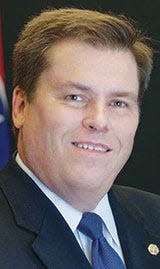DA: No crime committed by Clinton police officer in shooting death of 25-year-old man

Anderson County District Attorney General Dave Clark said a Clinton police officer did not commit a crime in the March 3 shooting death of a 25-year-old man.
Clark concluded his report on the investigation into the killing of Isaiah Gregory Hill by Clinton police officer Matt Howell by saying the real issue was mental illness.
"Hill and his grandmother recognized that he was mentally ill. He was taking medications that suggested that he had received treatment for a mental health condition. Hill and his grandmother apparently knew that he was having a mental health crisis ... It seems that our community is aware that mental health services are inadequate, but somehow, as a society, we seem resigned to accept that situation or we see no answers.
"I continue to hope that we can do better," the district attorney general concluded.
What happened?
Clark's lengthy report included the findings of the Tennessee Bureau of Investigation, the agency that typically investigates police shootings. The following description is Clark's summary of the TBI findings based upon interviews with witnesses, the officer and video recordings from the officer's patrol vehicle and a neighbor's security camera.
Hill's grandmother, Patricia McMahan, called 911 a little after 8 pm. March 3 requesting help for her suicidal grandson at the Calloway Village Apartments, 1000 Medaris St. in Clinton. Officer Howell was on patrol and knew he was responding to a call for a suicidal person. He got out of the car, walked in front of it and heard a woman yell, "He wants to kill himself."
Howell saw Hill coming at him quickly carrying a large knife. The officer said he commanded Hill to "drop it" and to "get back, get back," but Hill continued toward him and Howell retreated backwards, falling and breaking a bone in his arm. He drew his pistol from the holster and fired two shots at Hill, which struck him.
Howell stood up and and kicked away Hill's knife and got first aid equipment from his vehicle. The officer heard someone yell, "get down," and he looked back to see Hill was standing again and walking toward the apartment. As the officer approached, Hill collapsed back to the ground. Howell began administering first aid.
"While rendering aid, Howell asked Hill, 'Why did you force me to shoot you?' and Hill replied, 'I want to die.' Witnesses at the scene observed Howell rendering aid to Hill and saying to him, 'Stay with me.'"
Howell directed another officer to call for an ambulance and at least one witness also called for medical help. An ambulance arrived and Hill was taken to a hospital. Hill told an ambulance worker he wanted to die and that he was unlucky because he wasn't shot in the head. He also asked ambulance personnel to let him die.
He died later that evening.
An autopsy showed one bullet hit his torso, killing him, and the other remained under the skin, but didn't penetrate the chest. Toxicology reports showed the presence of prescription medications typically used for the treatment of epileptic seizures, muscle relaxation, schizophrenia and opioid dependence.
The autopsy also showed Hill had wounds to his arms. The forensic pathologist told the TBI that Hill had severed arteries in both wrists that would have resulted in him bleeding to death.
Grandmother's statements
Clark's report stated Hill's grandmother made a written statement to the Clinton Police Department in which she said her grandson hadn't slept for four days and seemed depressed, anxious and teetering on "full blown psychosis," which he'd experienced before. She described him stabbing himself with a large knife and that's when she called 911. She said he "still had the knife in his hand and the officer told him to put it down but he didn't because he was suicidal and psychotic." The officer, she said, shot him at least twice.
The TBI called her and she said she wouldn't speak to them. However, she had telephone call with a "noninvestigative TBI staff member" and made a number of statements.
She said Howell should have called a mobile crisis service and turned on his patrol vehicle's flashing lights.
"She alleges that a dog, billy club, taser or pepper spray should have been used instead of gunshots. She also adds that (Howell's) Marine training (presumably hand-do-hand combat) should have been used. I will add to that list a bean bag gun, verbal de-escalation techniques or shooting the suspect in the arm or leg. Ms. McMahan also adds calling mobile crisis or retreating to the safety of the police cruiser as other alternatives," Clark said.
"The problem in this situation was that there was not time or opportunity for any of these alternative tools or strategies," Clark said.
"Hill wanted to die and as he told Howell and the (emergency medical service) responder, he wanted Howell to kill him or as it is sometimes phrased, 'suicide by cop.'"
Clark said he found no probable cause that Howell committed a crime or that there was any fault with his performance that night.
"I cannot imagine what he could reasonably be expected to have done differently and in fact, in many ways Howell was called into a trap that night that caused him to have to fight for his own life and that he is still dealing with through the lingering cloud of this investigation," Clark stated.
The Oak Ridger's News Editor Donna Smith covers Oak Ridge area news. Email her at dsmith@oakridger.com and follow her on Twitter@ridgernewsed.
Support The Oak Ridger by subscribing. Offers available at https://subscribe.oakridger.com/offers.
This article originally appeared on Oakridger: DA: No crime committed by Clinton officer in killing of 25-year-old
